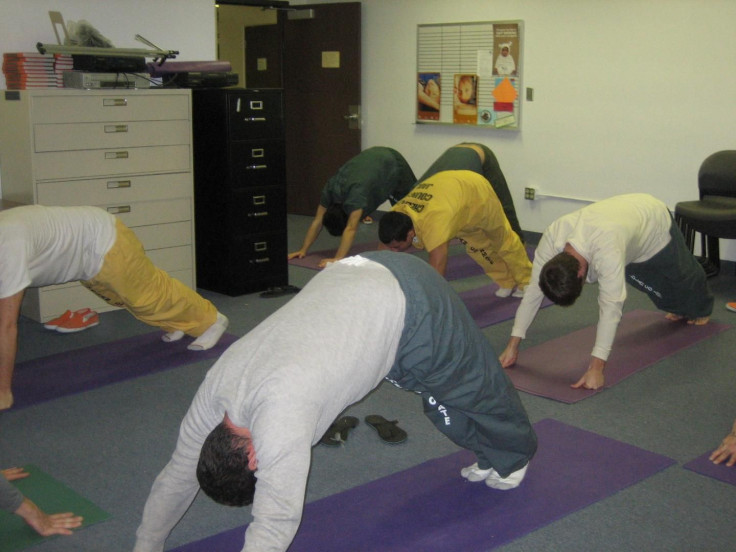Fit Fathers: Yoga In Jails Helps Male Prisoners Become Better Dads

Yoga has been shown to improve health in a variety of ways — from boosting mental health to reducing chronic pain. Now, new research shows that yoga can benefit a seemingly unlikely group: fathers in jail.
The study, out of Washington State University, examined inmates at Chelan County Regional Jail in Wenatchee, Wash. The researchers watched 14 different groups of inmates partake in yoga classes over the course of three years. All of the participants were fathers of young children.
In the past, studies have linked mindfulness, yoga, and reduced risky behaviors among incarcerated populations, the authors explain in their abstract. “The present study extends current knowledge by combining a parenting program with yoga instruction in a 12-session series delivered to incarcerated fathers,” they wrote.
The researchers set up a program called “Fit Fathers, Successful Families, Inside and Out” and recruited fathers in the inmate population to join. The goal of the program was to improve parental resilience and competency, as well as reduce child abuse rates. They found that yoga paired with a parenting program helped the inmates accept a sense of vulnerability and responsiveness to children.
“Yoga can be physically demanding, and the initial responses we got from the participants confirmed that,” Jennifer Crawford, a lead author of the study, said in the press release. “I believe the yoga practice helped participants become ready to learn and increased their willingness to try new ideas, absorb new information and begin to apply these in their lives.”
Many of the inmate fathers lived through childhoods with little parental support, so the researchers hope that an intervention would help stop the vicious cycle of “multi-generational cascade[s] of low resilience and less effective parenting,” they wrote.
Teaching resilience through the class proved to be effective, and they hope that they can expand the program to more prisons.
“A resilient person is one who can successfully navigate difficult life experiences, and emerge from these experiences a stronger and healthier individual,” the authors wrote in the study. “A resilient person does not simply bounce back, but bounces forward, transformed by the process of moving through personal challenges. This process involves decreasing stress, effectively solving problems, and building healthy relationships with others that result in positive changes and growth. Parental resilience specifically includes the ability to nurture children in the face of stressful situations, which in turn cultivates resilience in children as well.”
Source: Crawford J, Shrestha G, Hill L. Preliminary Evidence for Infusing Mindfulness, Yoga and Parenting Education Training on the Resilience-building Capacity for Incarcerated Fathers. Washington State University. 2015.
Published by Medicaldaily.com



























